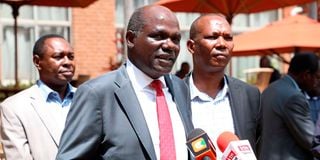Regrets? Not me, Wafula Chebukati insists

IEBC chairman Wafula Chebukati addresses journalists at Utalii Hotel, Nairobi, yesterday.
Independent Electoral and Boundaries Commission (IEBC) chairman Wafula Chebukati yesterday said he has no regrets as he leaves office after six years at the helm.
Mr Chebukati said he looks back at his time at the commission with fondness.
He was appointed head of the IEBC in January 18, 2017, following his nomination a month earlier.
Mr Chebukati and six other new commissioners succeeded Mr Ahmed Issack Hassan and his team.
During a meeting with the Political Parties Liaison Committee at Kenya Utalii College in Nairobi, Mr Chebukati – whose term expires on January 17 – said he made significant contributions to strengthening the IEBC.
Despite the August 9 presidential election leading to a split in the IEBC – the division pitting the old commissioners against new ones – Mr Chebukati said the vote was a success.
He leaves the agency with Prof Abdi Guliye and Mr Boya Molu, two of the surviving commissioners appointed in 2017.
The other four – Consolata Nkatha, Roselyn Akombe, Paul Kurgat and Margaret Mwachanya – resigned in a huff after the 2017 General Election.
Mr Chebukati urged his successor to leverage on the reforms he initiated and implemented at the commission “to ensure the IEBC continues being independent”.
“I have no regrets. I made my contribution in strengthening the commission. The person taking over should build on the reforms,” the outgoing IEBC chairman said.
“We went through many challenges in 2022 but the election was a success. We should build on success stories.”
The IEBC chairman, however, said three areas need improvement for foolproof elections.
He cited legal reforms, especially touching on electoral management laws; improvement of technology in results transmission and enhancing funding.
“The government should ensure that the disbursement of funds to the commission is early enough to enable the IEBC make early preparations and not in the last year to the election like what happened in 2022,” Mr Chebukati said.
He challenged political parties to carry out free, fair and credible primaries and stick to their rules and nomination lists to address the problem of aggrieved politicians choosing to contest as independents.
According to Mr Chebukati, the August General Election – “which was very peaceful” – demonstrated that democracy in Kenya has come of age.
Also Read: How careers are killed at IEBC
He added that the post-election evaluation report the commission is preparing will be made public in January.
The report, Mr Chebukati said, would guide policy direction and planning for future elections.
Registrar of Political Parties Anne Nderitu said 78 outfits fielded candidates in the August 9 General Election, with 48 having at least one elected member.
She said her office cleared 82 political parties ahead of the 2022 elections but the number has grown to 89 as seven parties, which had begun their registration, have been issued with certificates.
“Fielding a candidate is a mark of democratic competition. When a party fails to do so, the same party is defeating this,” Ms Nderitu said.
She lauded political parties for embracing alternative dispute resolution mechanisms.
By doing that, the number of disputes heading to court reduced by half in 2022 compared to 2017.
Ms Nderitu, nonetheless, called for reforms on regulations governing consensus to give redress to individuals who lose during the process so that they do not feel disenfranchised.
She talked strongly against party-hopping and weak political party ideologies.
“The country also needs to reconsider pre-election coalitions and embrace post-election pacts against the backdrop that parties want to move just before elections or immediately after,” she said.





